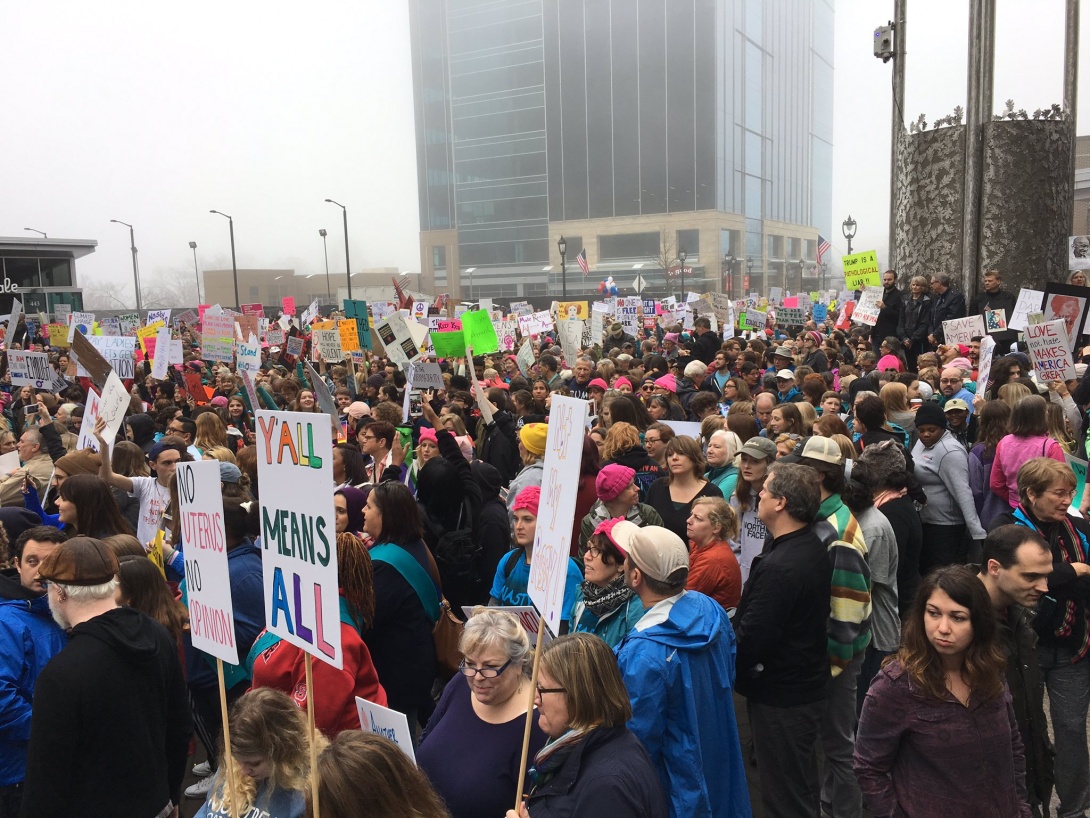Hundreds of thousands mobilize in women's marches across the South

The Womens' March in Raleigh, N.C., on Jan. 21 — one of 100 demonstrations in the South and more than 500 across the U.S. — drew 17,000 to 20,000 participants. (Photo via WomensMarchOnRaleigh Twitter feed)
They're being called one of the biggest protests in U.S. history: On Saturday, Jan. 21 — one day after the inauguration of President Donald Trump — millions of people joined Women's Marches in more than 500 towns and cities across the country.
Drawing on reports from newspapers, social media, march organizers and other sources, Erica Chenoweth at the University of Denver and Jeremy Pressman at the University of Connecticut created a database to inventory turnout at the protests.
Their estimate: at least 3.3 million came out to the Women's March events, a figure that's incomplete because turnout reports are still coming in.
The South was well-represented in the Jan. 21 demonstrations, according to the reports. Busloads from around the South arrived in Washington, D.C., for the main demonstration — which drew more than half a million people — and many more went to "sister marches" across the region.
Chenowith and Pressman document more than 100 events in Southern towns and cities. Events ranged from massive demonstrations mobilizing more than 20,000 people in cities including Atlanta, Houston and Nashville to an event in Helena, Arkansas, that reportedly drew two people.
Altogether, between 320,000 and 410,000 marchers gathered for events spanning all 13 Southern states. Events across the region included:
ALABAMA: More than 5,000 gathered in Birmingham, a city steeped in protest history. In the words of organizer Dalia Abrams, "We are marching in the footsteps of those who went before us for civil rights and equal rights for all. We hope they would be proud of what we've learned from them." Demonstrators also gathered in Huntsville, Mobile and Mentone.
GEORGIA: Officials estimate more than 60,000 came out for the Atlanta March for Social Justice and Women, which stretched for over a mile in making its way from the Center for Civil and Human Rights to the state capitol. At the front was Rep. John Lewis (D), who said, "I marched in Nashville, I marched in Washington, I marched from Selma to Montgomery. I'm ready to march again." Events were also held in Athens, Augusta, Savannah, Statesboro and Zebulon.
NORTH CAROLINA: A crowd of 17,000 to 20,000 gathered in Raleigh for North Carolina's biggest Women's March. A diverse range of grassroots leaders stressed the march's connection to struggles for racial equality, labor and LGBT justice. "We are not a monolith," said Nia Wilson, executive director of Durham's SpiritHouse. "We are undocumented, we are disabled, we are trans, we are witches, we are Muslims, we are Christians, we are Jews. And we can be alchemy. We can bring the most brilliant parts of ourselves together and create something so invaluable that we will never be beat."
Thousands more came to events in Asheville, Black Mountain, Charlotte, Greensboro, Hillsborough, Mooresville, Morganton, New Bern, Ocracoke, Saxapahaw, West Jefferson and Wilmington.
TEXAS: "I think there's a time and a place to be furious and this is the time," said a woman attending a march in Austin, which police estimate drew 40,000 to 50,000 people.
At least 18 other Texas towns and cities held events, including majority-Democratic cities like Dallas, Houston and San Antonio, as well as smaller, conservative enclaves like Abeline, Beaumont, Lubbock and Wichita Falls, where the events were especially important to local participants. “Even though this is such a small, conservative town, that so many people are here is just fantastic," said Ren Reed in Abeline, where 200 had gathered. "Public demonstrations like this prove to people that they're not alone.”
WEST VIRGINIA: In a state where more than two-thirds of voters cast ballots for President Trump, more than 3,000 gathered in the capital city of Charleston, where they sang "Bread and Roses," a labor song made popular during the 1912 miners' strike. As former state delegate Nancy Guthrie, who lost her Kanawha County race by just 13 votes this year, told the crowd: "There's an awful lot of us who thought you all were asleep. But you're not asleep. You're wide awake, and you're here."
Tags
Chris Kromm
Chris Kromm is executive director of the Institute for Southern Studies and publisher of the Institute's online magazine, Facing South.
